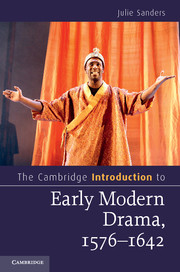Book contents
- Frontmatter
- Dedication
- Contents
- List of illustrations
- Preface: an outline of approaches taken
- Acknowledgements
- List of abbreviations and editions
- Introduction: Brick, lime, sand, plaster over lath and ‘new oaken boards’: the early modern playhouse
- Case study A Richard III at the Globe
- Case study B An outdoor theatre repertoire: the Rose on Bankside
- Chapter 1 Tragedy
- Case study C Opening scenes
- Case study D Staging violence and the space of the stage
- Chapter 2 Revenge drama
- Case study E ‘Here, in the Friars’: the second Blackfriars indoor playhouse
- Case study F The social life of things: skulls on the stage
- Chapter 3 Histories
- Case study G Title pages and plays in print
- Chapter 4 Comedy, pastoral and romantic
- Case study H The boy actor: body, costume and disguise
- Chapter 5 City comedies
- Case study I The dramaturgy of scenes
- Case study J Collaborative writing or the literary workshop
- Chapter 6 Satire
- Case study K Topical theatre and 1605–6: ‘Remember, remember the fifth of November’
- Case study L ‘Little eyases’: the children's companies and repertoire
- Chapter 7 Tragicomedy
- Case study M The visual rhetoric of dumb show
- Conclusion: The wind and the rain: the wider landscape of early modern performance
- Chronology
- Notes
- Bibliography
- Index
- Cambridge Introductions to . . .
Chapter 7 - Tragicomedy
Published online by Cambridge University Press: 05 June 2014
- Frontmatter
- Dedication
- Contents
- List of illustrations
- Preface: an outline of approaches taken
- Acknowledgements
- List of abbreviations and editions
- Introduction: Brick, lime, sand, plaster over lath and ‘new oaken boards’: the early modern playhouse
- Case study A Richard III at the Globe
- Case study B An outdoor theatre repertoire: the Rose on Bankside
- Chapter 1 Tragedy
- Case study C Opening scenes
- Case study D Staging violence and the space of the stage
- Chapter 2 Revenge drama
- Case study E ‘Here, in the Friars’: the second Blackfriars indoor playhouse
- Case study F The social life of things: skulls on the stage
- Chapter 3 Histories
- Case study G Title pages and plays in print
- Chapter 4 Comedy, pastoral and romantic
- Case study H The boy actor: body, costume and disguise
- Chapter 5 City comedies
- Case study I The dramaturgy of scenes
- Case study J Collaborative writing or the literary workshop
- Chapter 6 Satire
- Case study K Topical theatre and 1605–6: ‘Remember, remember the fifth of November’
- Case study L ‘Little eyases’: the children's companies and repertoire
- Chapter 7 Tragicomedy
- Case study M The visual rhetoric of dumb show
- Conclusion: The wind and the rain: the wider landscape of early modern performance
- Chronology
- Notes
- Bibliography
- Index
- Cambridge Introductions to . . .
Summary
Tragicomedy has been described as the ‘Cinderella’ of early modern genres and certainly watching a tragicomic drama unfold can sometimes feel like a highly uncomfortable combination of fantastic events, high melodrama, impossible outcomes and see-sawing emotions. In trying to pin down what exactly the tragicomic aesthetic is in comparison to the other dramatic genres and subgenres we have discussed so far in this study, perhaps it is this notion of a slightly uncomfortable hybrid of multiple genres that takes us nearest to the essence. Tragicomedy, as its compound title suggests, is full of happenings and events that seem to be steering us on a full-blown course to tragedy and death only to be suddenly and sometimes miraculously subverted or resolved happily at the midnight hour; tragicomedies, while frequently set in the same Italianate courts full of rival monarchs, sycophants, pretenders and favourites, and featuring the same inevitable imperilled lovers as the revenge drama of Webster or Middleton explored in Chapter 2, in contrast to those plays feature multiple ‘resurrections’ – the case of Hermione's statue in Shakespeare's The Winter's Tale is perhaps the best-known example – and pretended or faked deaths as opposed to the stage scattered with corpses more familiar from revenge tragedy. In discussing the emergence of tragicomedy as form in the early seventeenth century, then, we will necessarily have recourse to other texts to which the plays in this mode refer or allude and often, as we shall see, actively rewrite. We begin from the supposition that tragicomedy is a highly intertextual and indeed intertheatrical force and that from this stems much of its performative energy. This demands yet again an attentive spectatorship that can build on and make meaning from these intertextual angles but also one that, as the above descriptive terms indicate, is unsettled and unseated by the often deliberate dissonance or strangeness of what is taking place before their eyes.
- Type
- Chapter
- Information
- The Cambridge Introduction to Early Modern Drama, 1576–1642 , pp. 179 - 196Publisher: Cambridge University PressPrint publication year: 2014



